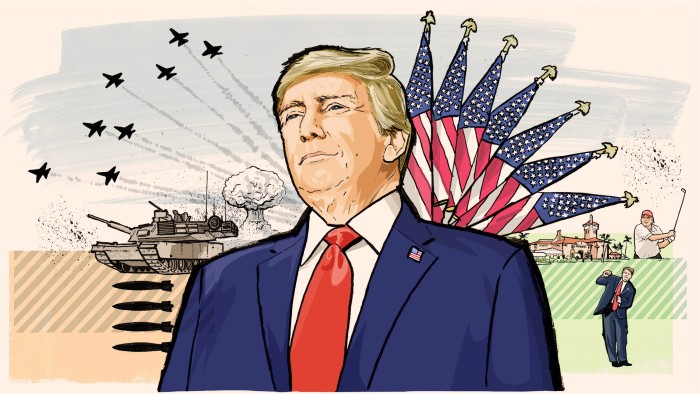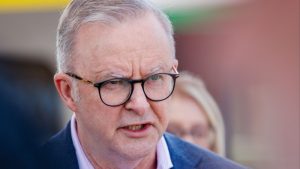FT Person of the Year: Donald Trump

On January 20 2021, Donald Trump boarded Air Force One for what most people assumed was the last time. He was going back to Palm Beach. A fortnight earlier he had helped goad a mob assault on Capitol Hill — the first attack on America’s legislature since it was set on fire by British troops during the war of 1812.
Few of Trump’s entourage turned up at Andrews Air Force Base to wave him off. Mitch McConnell, the Senate Republican leader, had just called Trump a “despicable human being”. Rupert Murdoch, owner of Fox News, which had been Trump’s biggest cheerleader, vowed in an internal email to make him a “non-person”.
Much of America and the world agreed with Joe Biden’s contention that Trump’s presidency had been “an aberrant moment”. A handful of loyalists, notably Steve Bannon, Kash Patel, Richard Grenell, Stephen Miller, Peter Navarro and Boris Epshteyn stuck with Trump over the following months. In Maga mythology, this was Trump’s wilderness period.
“Mar-a-Lago was like East Berlin,” recalls Bannon, a self-declared nationalist-populist who was Trump’s chief strategist during his first year in office. “We were a band of pirates. Everybody else was writing Trump off.”
Trump’s rebound since then is the most dramatic comeback in modern US history — and arguably since the republic’s founding. Only once before, with Grover Cleveland in 1892, has a US president been returned to office for non-consecutive terms. The Financial Times made Trump its “Person of the Year” in 2016. This year Trump is again the FT’s pick because of the remarkable nature of his return to power. It is no longer possible to dismiss Trump as a blip.

At home, Trump 2.0 promises a new era of sweeping deregulation and tax cuts. The president’s vow to personify the Maga base’s appetite for retribution against the liberal elites — universities, the mainstream media and “woke” America in general — heralds a profound shift to the cultural right. Abroad, Trump also vows a new iconoclasm. For the so-called “axis of upheaval” of China, Russia, Iran and North Korea, Trump’s return could be the opportunity of a generation, although he remains unpredictable. Trump sees the world as a jungle in which the US has been taken for a ride by freeloading allies. The future of Nato is hanging by a thread.
“We are living in the age of Trump,” says Roger Stone, a longtime Trump political and business collaborator, who has known him since the late 1970s. “Historians will look back on 2024 as a change of era like they have for [the election of] 1932, when Roosevelt’s New Deal came in, or for 1968 when Richard Nixon gave birth to the new right.”
Trump has prepared a flurry of “day one” moves that would put any previous incoming presidency into the shade. It includes executive orders to start deporting undocumented migrants, mass pardons for the rioters jailed for the January 6 attack, a new era of oil drilling, free speech ordinances on US universities, and so on. Together these would amount to a sea change in how America is governed. Trump has also vowed a purge of generals at the Pentagon and investigations into those who investigated him.
Though he has already had one bite of the apple, the question of how much more disruptive the next Trump term will be is hard to gauge. “Trump is a classic Gemini,” says Anthony Scaramucci, a New York financier who first befriended Trump in the 1990s and who was briefly Trump’s White House communications director. “You could get the genial, joking, golfing Trump, or you could get his evil, vengeful twin. Maybe we’ll see both.”
There are strong grounds to believe that Trump will pursue revenge against his domestic adversaries. His choice of Patel, an ultra-loyalist with a published enemies list, as the next FBI director is exhibit A. Though Trump’s first pick for attorney-general, Matt Gaetz, had to drop out amid a storm of sex allegations, his new nominee, Pam Bondi, is a diehard supporter. Pete Hegseth, his pick for secretary of defence, has built a Fox TV persona on calling out political correctness and alleged un-American sentiments at the Pentagon. Tulsi Gabbard, his choice for director of national intelligence, is a sworn enemy of the “deep state”.

But there is a large contingent of Washington observers who think (perhaps wishfully) that Trump, who turns 79 in June, will take to the golf course even more than before. Other Trump picks, such as Marco Rubio for secretary of state, Mike Waltz as national security adviser and Scott Bessent as Treasury secretary, are more business-as-usual. His son-in-law Jared Kushner has been telling people that he has never seen Trump as happy as he has been since November 5. The spectre of prison time and the onslaught of investigations are now behind him.
“Trump’s retribution will be a strong economy,” says Susie Wiles, his 2024 campaign manager and incoming White House chief of staff. “Over time a lot of the strong feelings have gone away.”
Though she is close to Trump, Wiles’ view is in the minority. Maga folklore says that Trump was provoked into another run by the Biden administration’s “lawfare” against him. But the sequence implies, if anything, that it was Trump’s renewed White House run that triggered the legal investigations, not the other way round. Merrick Garland, Biden’s outgoing attorney-general, only appointed Jack Smith as special counsel on November 18 2022. That came three days after Trump had launched his 2024 campaign at a sparsely attended event in Mar-a-Lago.

The flurry of cases against Trump only propelled his public ratings. To parts of blue-collar America, Trump was a victim of the same forces they despise — overzealous prosecutors and self-righteous liberals. To some in plutocratic America, Trump’s hatred of the deep state sounded like a much-desired war on bureaucracy and regulation. To some minorities, including a remarkably large share of young men of all races, Trump was their cudgel against what they consider to be a distinctly gendered new form of political correctness.
“Why do you think Trump got so many young male African-American and Hispanic votes?” asks Bannon. “They also see the system as rigged against them.”
In March 2023, Trump ignited the base when he vowed that “I will be your retribution”. In the 24 hours after Trump was found guilty in New York over his misuse of hush money payments to a porn star, Stormy Daniels, he raised a record in small donations. His second biggest fundraising day for small donations came in August 2023, when he released a photo of his police mugshot after his indictment in Georgia on election-interference charges. In retrospect, the cases came not only too late, they were also key to Trump’s resurgence.
Trump’s transition this time is the mirror image of 2016. Then he fought a renegade campaign that was shunned until the last minute by the Republican establishment and run by an ever-changing cast of outsiders who did not expect him to defeat Hillary Clinton. Neither did Trump. Lacking a plan after the election, Trump appointed a team of so-called adults to run his administration.
This time, his campaign was run by seasoned professionals — led by Wiles and Chris LaCivita — while most of his nominees for senior positions are Maga believers. People associated with the Heritage Foundation-led Project 2025 — a compendious blueprint for Trumpism in action — are heavily represented.

“Those who are worried that Trump is coming for them should be worried,” says Bannon. “It is what the base expects.” Wiles disagrees. One of them will soon be proved right.
Trump has also taken far more detailed interest in the staffing of his administration. In 2016, he picked a handful of cabinet principals and left the lower-level appointments to others. This time, he has personally interviewed candidates for dozens of second-order jobs, such as the head of the Federal Trade Commission, the Federal Communications Commission, the Internal Revenue Service, the civil rights division of the Department of Justice and numerous other jobs. Trump’s round-the-clock auditioning at Mar-a-Lago has no parallel to earlier transitions, including Trump 1.0. “His attention to personnel selection is remarkable,” says Wiles.
Instead of Trumpism without Trump, we are seeing Trump with fleshed-out Trumpism. His agenda includes creating the so-called Department of Government Efficiency run by Elon Musk, the world’s richest man, and Vivek Ramaswamy, another billionaire and former Republican candidate. Their primary goal is to deconstruct the administrative state.
What will Trump 2.0 mean for the world? At his first inauguration in 2017, Trump spoke of the “American carnage” caused by globalisation and China. During his first term, he also threatened to abandon Nato over “unpaid dues” by some of its European members. This time he brings similar threats but with more teeth. He has also promised to solve the Russian war on Ukraine “within 24 hours”. Though he has appropriated Ronald Reagan’s slogan of “peace through strength”, that gives little guidance to what he will do in practice. His parallel pledge of “America First” covers the opposite end of the geopolitical spectrum.
“It is impossible to predict what a man without a foreign policy philosophy will do — Trump is purely transactional,” says John Bolton, who was Trump’s national security adviser for 18 months in his first term. “The big difference is that he will be surrounded by ‘yes’ people this time.”

The future of America’s alliances looks parlous. The impending withdrawal of US support for Ukraine is already throwing Europe into disarray. With Germany in limbo pending its February election, and Emmanuel Macron’s French presidency in the balance, Trump will have open season to sow further division in the EU — a body he has always disdained.
Trump’s other foreign policy signals since November 5 have been mixed. Nobody was expecting his first threats of trade war to be directed at Canada and Mexico, on which he vowed 25 per cent across-the-board tariffs. But the move was classic Trump, and flushed out the relative strengths and weaknesses of his counterparts.
Canada’s embattled prime minister, Justin Trudeau, instantly flew to Mar-a-Lago to try to strike a deal. After returning home empty-handed, he was mocked by Trump as the governor of the “great state of Canada” — a reference to the joke about it being America’s 51st state. By contrast, Mexico’s recently inaugurated president, Claudia Sheinbaum, rebutted Trump’s demands in icily correct language. “We negotiate as equals, there is no subordination here, because we are a great nation,” Sheinbaum said.
It is conceivable that China, which is America’s third-largest trading partner but which has by far the largest trade surplus, will strike a deal with Trump. It is equally possible that China and the US will embark on a full-blown trade war. The only link between the two scenarios is that it is Trump who will decide, not his team.
“Trump believes he can fix every problem by himself by talking to his counterparts,” says Bolton. “That can take events in strange directions.”
In early December, Trump travelled to Paris to attend the reopening of Notre-Dame, France’s grand cathedral. Trump was greeted warmly by Europe’s notables, including Britain’s Prince William. He was also hugged by Macron in spite of Trump having just appointed Charles Kushner, a convicted felon and father-in-law to his daughter Ivanka, as US ambassador to France. “This time Europe laid out the red carpet for Trump,” says Stone.
He also struck up a friendly conversation with Jill Biden, who went in her husband’s stead. Two days later Trump released an advertisement for his branded men’s perfume “Fight, fight, fight” against a photo of him and Jill Biden making friendly chit chat. “A fragrance your enemies can’t resist”, said the commercial. The Trump cologne joins his $59.99 made-in-China “God Bless America Bible” and other Trump merchandise on sale. He is always on the lookout for deals. Trump and Musk might talk of steep cuts to US federal spending. In reality, they are likelier to make far bigger inroads into deregulation, particularly for cryptocurrency and artificial intelligence.
Approaching his ninth decade, Trump is at an unconventional age to be presiding over a change in the global order and a realignment in US politics. The extent of Trump’s coming radicalism at home and abroad is still a matter of guesswork.
“We are embarking on a new era,” says Stone. “There will be no going back.”
Others forecast that Trump 2.0 will spell chaos, not a new order. Whichever it is, Trump’s return heralds a new gilded age for money in US politics and diplomacy. He looks set to start with a cabinet of billionaires.
“Never forget that Trump wrote The Art of the Deal,” says another Trump acolyte. “Whatever is going on, he is always, always searching for an angle.”
#Person #Year #Donald #Trump




